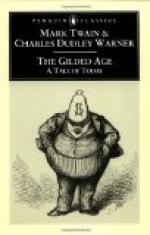It took but a trifle to pay Hawkins’s outstanding obligations, for he had always had a horror of debt.
When Clay bade his home good-bye and set out to return to the field of his labors, he was conscious that henceforth he was to have his father’s family on his hands as pensioners; but he did not allow himself to chafe at the thought, for he reasoned that his father had dealt by him with a free hand and a loving one all his life, and now that hard fortune had broken his spirit it ought to be a pleasure, not a pain, to work for him. The younger children were born and educated dependents. They had never been taught to do anything for themselves, and it did not seem to occur to them to make an attempt now.
The girls would not have been permitted to work for a living under any circumstances whatever. It was a southern family, and of good blood; and for any person except Laura, either within or without the household to have suggested such an idea would have brought upon the suggester the suspicion of being a lunatic.
CHAPTER VII.
Via,
Pecunia! when she’s run and gone
And
fled, and dead, then will I fetch her again
With
aqua vita, out of an old hogshead!
While
there are lees of wine, or dregs of beer,
I’ll
never want her! Coin her out of cobwebs,
Dust,
but I’ll have her! raise wool upon egg-shells,
Sir,
and make grass grow out of marrow-bones,
To
make her come!
B.
Jonson.
Bearing Washington Hawkins and his fortunes, the stage-coach tore out of Swansea at a fearful gait, with horn tooting gaily and half the town admiring from doors and windows. But it did not tear any more after it got to the outskirts; it dragged along stupidly enough, then—till it came in sight of the next hamlet; and then the bugle tooted gaily again and again the vehicle went tearing by the horses. This sort of conduct marked every entry to a station and every exit from it; and so in those days children grew up with the idea that stage-coaches always tore and always tooted; but they also grew up with the idea that pirates went into action in their Sunday clothes, carrying the black flag in one hand and pistolling people with the other, merely because they were so represented in the pictures—but these illusions vanished when later years brought their disenchanting wisdom. They learned then that the stagecoach is but a poor, plodding, vulgar thing in the solitudes of the highway; and that the pirate is only a seedy, unfantastic “rough,” when he is out of the pictures.
Toward evening, the stage-coach came thundering into Hawkeye with a perfectly triumphant ostentation—which was natural and proper, for Hawkey a was a pretty large town for interior Missouri. Washington, very stiff and tired and hungry, climbed out, and wondered how he was to proceed now. But his difficulty was quickly solved. Col. Sellers came down the street on a run and arrived panting for breath. He said:




